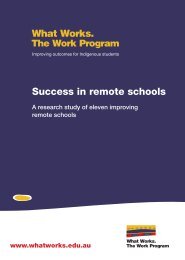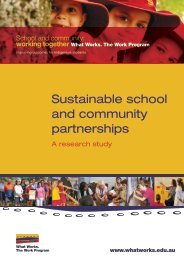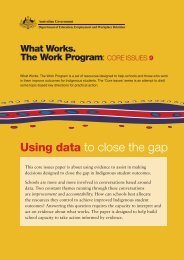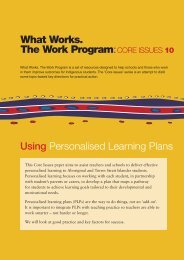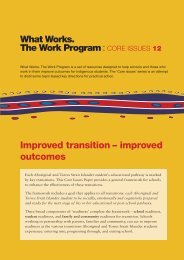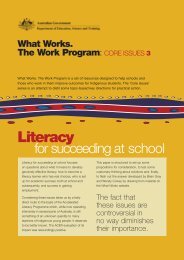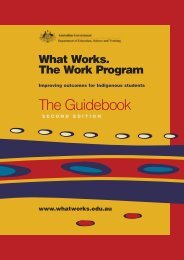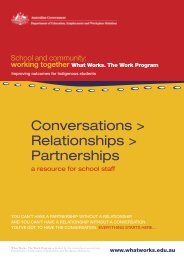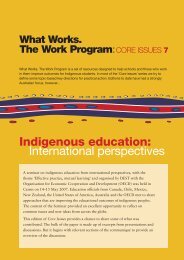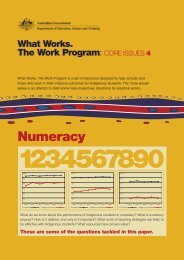Bound for Success Scope and Sequence Statements
Bound for Success Scope and Sequence Statements
Bound for Success Scope and Sequence Statements
- No tags were found...
You also want an ePaper? Increase the reach of your titles
YUMPU automatically turns print PDFs into web optimized ePapers that Google loves.
STUDIES OF SOCIETY AND ENVIRONMENTSystems Resources <strong>and</strong> PowerConcept In Year 1the student:In Year 2the student:In Year 3the student:In Year 4the student:In Year 5the student:In Year 6the student:In Year 7the student:In Year 8the student:In Year 9the student:Citizenship <strong>and</strong>GovernmentRules <strong>and</strong> laws – theLegislative system.• Knows that rules tell youwhat you should <strong>and</strong>shouldn’t do.• Responds to simple rulesat school.• Can say some of the rulesthat exist in their home(e.g. says “ we have a rulethat we are not allowed togo swimming straight afterdinner”).• Knows that there areconsequences if they‘break the rules’.• Knows that rules have tobe followed <strong>and</strong> there areconsequences if theyaren’t (e.g. knows thatthey will get into troublefrom the teacher if theybreak the rule ‘don’t leavethe room withoutpermission’).• Identifies rules <strong>and</strong>responsibilities ofmembers of the schoolcommunity, (e.g. says“everyone has to turn offthe tap after they havewashed their h<strong>and</strong>s”).• Knows some of the rulesof the community (e.g.‘dogs must be kept on alead in public places’, or‘don’t leave litter on thebeach’).• Knows that if they breakcommunity rules they mayget a fine or some otherpunishment.• Gives examples of rulesapplied within families,classrooms, schools <strong>and</strong>identify theirfunction/purpose, (e.g.says “a rule we have athome is don’t talk whenyou mouth is full <strong>and</strong> thisis so that people can’t seefood in your mouth”).• Contributes to discussionsin developing rules,considering fairness (e.g.says “we can’t have a rulethat lets the tallest peopleget their lunch firstbecause that is unfair”).• Recognises communityexpectations often outlinedin codes of behaviour <strong>and</strong>rules.• Discusses the purpose ofrules (e.g. knows that rulesgovern how sport isplayed; knows that rulesguide drivers on the road;knows the role rules playin the school community).• Identifies consequenceswhen people break rules<strong>and</strong> considers how peoplemake amends, (e.g. says “Iwas rude to my teacher soI had to say sorry <strong>and</strong> mypunishment was that Icouldn’t go to drama classthis week”).• Recognises that rules maybe considered ‘fair’ <strong>and</strong>‘unfair’ from a range ofperspectives (e.g. knowsthat some rules mayadvantage some people<strong>and</strong> disadvantage others).• Knows the differencebetween a rule <strong>and</strong> a law.• Underst<strong>and</strong>s that groups<strong>and</strong> communities interactaccording to rules (e.g.having listened to storiesthat illustrate codes ofconduct – such as Aesop’sFables, AboriginalDreaming stories <strong>and</strong> theBible, identifies the ‘rules’inherent in them).• Describes what mighthappen if people don’tobey the laws in society(e.g. if people don’t driveon the left h<strong>and</strong> side of theroad or stop at stop signs).• Knows what it means to‘break the law’.• Knows that every countryhas their own set of laws• Knows that some laws arespecific to the state ofQueensl<strong>and</strong> <strong>and</strong> others toAustralia.• Knows that some groupsin society have ‘socialrules’ that other groupsdon’t have (e.g. puttingyour h<strong>and</strong> over yourmouth when you cough orsaying ‘thank you’ whensomeone gives yousomething). HPE• Explores why society haslaws <strong>and</strong> examines whathappens when peoplebreak laws.• Explores whetherpunishment is always themost appropriateconsequence when a ruleor law is broken <strong>and</strong>considers other ways inwhich people can makeamends.• Discusses rules <strong>and</strong> lawsthat affect young people<strong>and</strong> assess these accordingto fairness <strong>and</strong>appropriateness.• Identifies key personnelwithin the legal systemwho help to protectpeople’s rights• Underst<strong>and</strong>s that aconstitution is an agreedset of rules of guidelines<strong>for</strong> an organisation.• Recognises that the lawsof other countries apply toAustralians when theytravel overseas.• Knows what a constitutionis (e.g. examines theconstitution <strong>for</strong> the localfootball club).• Knows that changes ininternational law mayaffect Australian law.• Underst<strong>and</strong>s that rules <strong>and</strong>laws result from decisionsabout rights <strong>and</strong>responsibilities.• Knows that the AustralianConstitution can bechanged through areferendum.• Knows the elements ofAustralia’s law <strong>and</strong> itsdevelopment.• Knows that laws arewritten by parliaments orthrough decisions made bytheir courts over time (e.g.the driving age <strong>and</strong> bloodalcohol limits).• Knows that laws maychange over time throughamendments.• Reflect on ways in whichchanging values caninfluence the law (e.g.smoking in public).• Recognise the role of thecourt system (includingfamily court, districtcourts, children’s courts,Magistrates) in upholdingthe law <strong>and</strong> democraticrights (freedom of speech,of the media, of religion,of association).• Underst<strong>and</strong>s that Australiahas a constitution thatdescribes the key featuresof the Federal system ofgovernment <strong>and</strong> can beamended by referendum.• Recognises that Australiais a signatory to a range ofinternational agreementsthat influence Australianlaw.• Knows about the role ofthe High Court ofAustralia.• Knows the elements of a‘fair trial’ <strong>and</strong> that peopleare ‘presumed innocent’until proven guilty.• Describes how laws aremade, administered <strong>and</strong>en<strong>for</strong>ced.• Relates some instanceswhere the justice systemmay have provided aseemingly ‘unjust’outcome (e.g. where oneperson may receive atougher sentence thananother person whocommitted the samecrime, in another city).• Knows about ‘humanrights’ <strong>and</strong> can talk aboutthese in various contexts(e.g. human rights ofIndigenous people overtime in Australia).• Identifies different levelsin legal structures <strong>and</strong> thecontributions they make tothe legal system(including district courts<strong>and</strong> Supreme Court).• Knows the principles oflaws includingindependence of thejudiciary, equality be<strong>for</strong>ethe law <strong>and</strong> innocent untilproved guilty.• Considers the role ofgovernment in developingpolicy <strong>and</strong> <strong>for</strong>mulatinglegislation.• Recognises that there aredifferent types of law (e.g.criminal <strong>and</strong> corporate).• Explores principles ofjustice includingindependence of thejudiciary, equality be<strong>for</strong>ethe law, presumption ofinnocence, the right ofappeal <strong>and</strong> restorativejustice.• Recognises that theAustralian Constitutionestablishes the powers <strong>and</strong>responsibilities of thenational parliament <strong>and</strong>the federal legal systemincluding the High Court.• Evaluates theeffectiveness ofinternational organisationsin protecting human rights(e.g. AmnestyInternational, UnitedNations).Rights <strong>and</strong>responsibilities• Identifies some rights <strong>and</strong>responsibilities of studentsin their class <strong>and</strong> in theschool (e.g. knows theyhave a right to feel safe<strong>and</strong> not be bullied). HPE• Displays personal rights<strong>and</strong> responsibilities asstudents, members of asporting team, or membersof the community (e.g.knows that as a member ofa sporting team aresponsibility is to trainwith the team <strong>and</strong> be ontime to play in the game<strong>and</strong> a right is to be treatedwith respect as a teammember). HPE• Identifies some rights <strong>and</strong>responsibilities of citizensin their local community(e.g. knows that everyonehas the right to use thetown library <strong>and</strong> that theresponsibility that goeswith that is to look afterthe books <strong>and</strong> let otherpeople read quietly).• Knows that somecommunity rules are abouthaving a responsibility tothe community (e.g. thepark/beach belongs to allthe people in thecommunity so we have aresponsibility to all keep itclean <strong>for</strong> everyone). HPE• Recognises that rightscome with responsibilities(e.g. if we want to usepublic recreation areas <strong>for</strong>enjoyment we have aresponsibility to help keepit clean) <strong>and</strong> that if wedon’t carry out ourresponsibilities there areconsequences (e.g. thepublic area may beclosed). HPE• Recognises discriminatingbehaviour (such astreating people differentlybecause they havedifferent coloured skin ortalk differently) <strong>and</strong>describes how this affectsthe rights of others (e.g.says “girls have as muchright as boys to playfootball at school”). HPE• Knows about ‘democraticrights’ <strong>and</strong> what they arein Australia includingfreedom of speech, of themedia, of religion <strong>and</strong> ofassociation.• Knows that rights helpprotect citizens fromexploitation <strong>and</strong> abuse.• Underst<strong>and</strong>s that rules <strong>and</strong>laws result from decisionsabout rights <strong>and</strong>responsibilities (e.g.knows that the purpose oflaw-making is to protectpeople <strong>and</strong> their property).• Explores the rights ofcitizens in ancient <strong>and</strong>historical societies (e.g.Ancient Greece, AncientRome, Ancient China).• Considers some rights <strong>and</strong>determine whether theresponsibilities that gowith them are fair.• Knows about ‘humanrights’ <strong>and</strong> can talk aboutthese in various contexts(e.g. human rights ofIndigenous Australianover time).• Knows what it means to‘think global, act local’ inthe context of Australiancitizens’ responsibilities inenvironmental issues suchas water usage. Sc• Defines, exercises <strong>and</strong>evaluates rights <strong>and</strong>responsibilities associatedwith being a young adultincluding the concept of‘working together <strong>for</strong> thecommon good’.• Underst<strong>and</strong>s that thefeatures of political <strong>and</strong>legal systems adapt toensure people’s rights <strong>and</strong>responsibilities.• Examines the rights <strong>and</strong>responsibilities of theworld’s countries in thecontext of globalwarming, nuclear weaponscapability, <strong>and</strong> otherglobal issues. Sc<strong>Bound</strong> <strong>for</strong> <strong>Success</strong> <strong>Scope</strong> <strong>and</strong> <strong>Sequence</strong> <strong>Statements</strong> V2 Page 73 Working Document Semester One 2007



